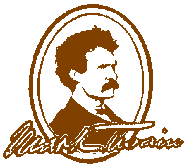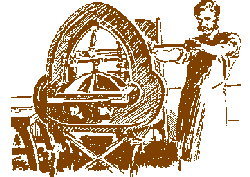 | Mark Twain and The TERRITORIAL ENTERPRISE by Michael Franks |
"Those Enterprise fellows make perfect nonsense of my letters - like all d--d fool printers, they can't follow the punctuation as it is in the manuscript. They have, by this means made a mess of senseless, d--d stupidity of my last letter."
The author of this complaint was an unknown, twenty-six year-old Missourian, a former printer himself and now a prospector hoping to strike a bonanza in Nevada Territory. It was June 1862 and for about two months he had been entertaining himself, in spare moments, by writing articles, in the form of letters, for the Territorial Enterprise, a newspaper in Virginia City. He signed these contributions "Josh" and they were welcomed by the paper and its readers. This amateur journalist's name was Samuel Langhorne Clemens. Within a few months he would discard "Josh" fot another pen name, perhaps the most famous the world has known - Mark Twain.
Sam Clemens had arrived in Carson City in August 1861 as unofficial assistant to his older brother Orion, who had been appointed Territorial Secretary by President Abraham Lincoln. Nevada's getrich contagion had immediately hit both brothers hard. Sam, the more outgoing and confident of the two, went headlong in pursuit of wealth. He filed timber claims along the shores of Lake Tahoe and took fliers on mining stock, buying and trading feet in a dizzying array of gold and sliver claims that promised much, but yielded nothing.
Capital was hard to come by--cash for prospecting, cash for speculating, and cash to live on while prospecting and speculating. Orion's modest government salary helped, as did the eiqht-dollars-a-day Sam earned for a few weeks as his brother's legislative clerk. His expenses were high in Nevada's boom ecomony and by midsummer 1862 Sam Clemens was in need of some regular source of income to keep body and soul together and hope alive. He had already had a taste of work in a quartz mill, long hours of shoveling silver-bearing ore into the pulverizing machinery. Having little tolerance for manual labor, he had hated that fearful drudgery and had no desire to return to it. Yet he was in debt and increasingly desperate. "The fact is," he wrote his brother, "I must have something to do, and that shortly, too." Providentially, the Territorial Enterprise came to his aid. Its management, impressed by the "Josh" letters, offered the post of local reporter, at a salary of twenty-five dollars a week. "Twenty Five dollars a week" -- he recalled ten years later in Roughing It -- "it looked like bloated luxury -- a fortune -- a sinful and lavish waste of money." He wasted no time in accepting.
He reached Virginia City in September 1862, in his own estimation a "rusty looking" specimen, "coatless, slouch hat, blue woolen shirt, pantaloons stuffed into boot-tops, whiskered half down to the waist, and the universal navy revolver slung to my belt. In Roughing it he described Virginia City as the "livest town, for its age and population, that America had ever produced":
The sidewalks swarmed with people -- to such an extent, indeed, that it was generally no easy matter to stem the human tide. The streets themselves were just as crowded with quartz wagons, freight teams and other vehicles. The procession was endless. So great was the pack, that buggies frequently had to wait half an hour for an opportunity to cross the principal street. Joy sat on every countenance, and there was a glad, almost fierce, intensity in every eye, that told of the money-getting schemes that were seething in every brain and the high hope that held sway in every heart. Money was as plenty as dust; every individual considered himself wealthy, and a melancholy countenance was nowhere to be seen. There were military companies, fire companies, brass bands, banks, hotels, theatres, "hurdy-gurdy houses," wide-open gambling palaces, political pow wows, civic processions, street fights, murders, inquests, riots, a whisky mill every fifteen steps . . . a dozen breweries and half a dozen jails and stationhouses in full operation, and some talk of building a church. The "flush times" were in magnificent flower!
The Territorial Enterprise was perfectly suited to this boisterous, optimistic community. It was a young paper. Its co-owners, Joseph T. Goodman and Denis E. McCarthy, both were in their twenties, younger even than Sam Clemens. Dan DeQuille (real name William Wright), the local editor and Clemens's mentor on the paper, was only in his early thirties. The Enterprise practiced the audacious, pugnacious, uninhibited journalism of the day and did so successfully. The paper was as booming as the rest of Virginia City, with a long list of subscribers and an income of thousands of dollars a month.
Clemens, with his irreverent outlook, his penchant for ridicule and exaggeration, was as suited to the Enterprise as the Enterprise was to its audience. Editor-in-chief Goodman's instructions to his novice local reporter, as recalled in Roughing It, were "to go all over town and ask all sorts of people all sorts of questions, make notes of the information gained, and write them out for publication."
In following these guidelines Sam Clemens may not have been the most diligent local reporter--and later local editor--who ever prowled the roistering streets of Virginia City, but he probably was the most imaginative. Stirring news, he felt, that was what a paper needed, and if he couldn't find it -- well, he could always manufacture it. And so, when the supply of actual events -- mining discoveries, accidents, knifings, shootings, fires -- was low he enlivened the paper with the products of his fertile mind. He conducted comic feuds with Dan DeQuille and with Clement T. Rice, reporter for the rival Virginia City Union, whom he dubbed "The Unreliable." He hoaxed readers with a squib about the finding of a petrified man, a "stone mummy" supposedly solidified forever in the act of winking knowingly and thumbing its nose. A bogus report of a deranged speculator's bloody massacre of his entire family fooled and then outraged most who read it. In a piece on the assaying of silver he promised "to talk science a little," but soon lost his way in the subject, he confessed, "owing to lager beer." He produced a long and graphic account of his sufferings after a dose of "Wake-up-Jake," a violent physic that "for the space of twelve hours ... vomited me and purged me and likewise caused me to bleed at the nose. And he celebrated the arrival of one New Year with this advice to the citizens of Virginia City: "Now is the accepted time to make your regular annual good resolutions. Next week you can begin paving hell with them as usual."
These efforts were not confined to Virginia City. Clemens visited San Francisco and other places and sent back lively reports to the Enterprise. When the paper dispatched him to Carson City to report on the Territorial Legislature and the state Constitutional Convention, he was capable of a workmanlike, professional job, but humor was likely to infect his accounts of even the most routine political deliberations. It was while he was in Carson City in early 1863 that he first signed himself "Mark Twain" -- at least the first surviving article bearing that signature dates from that time.
As Mark Twain, Sam Clemens now began to be famous -- or notorious. Frequently a character in his own Enterprise writings, he also became a subject for the other Virginia City papers. They playfully portrayed him as a town character, chiding him for laziness, for stealing news items from other reporters, for being overly-fond of whiskey, and even for having smelly feet. Sometimes the teasing turned nasty, as when the Evening Bulletin of August 5, 1863 addressed him as "that beef-eating, bleary-eyed, hollow headed, slab-sided ignoramous -- that pilfering reporter, Mark Twain." Generally, however, response to him and to his Enterprise writing was appreciative. In August 1863 he could boast to his mother and sister in St. Louis that he had "the widest reputation as a local editor, of any man on the Pacific coast." Ironically, the brazen, contentious, intentionally bumptious manner that made Mark Twain popular was to figure in his precipitate departure from Virginia City. The circumstances were these: in May 1864 the women of Carson City held a ball to raise money for the United States Sanitary Commission, the national agency that assisted Civil War sick and wounded. In an editorial he wrote while drunk one evening, Mark Twain jokingly suggested that the money raised at the Carson City event was to go not to the Sanitary Commission, but to "a Miscegenation Society somewhere in the East." Although these remarks were not intended for print they somehow found their way into the Enterprise. Indignant, the Carson City women protested. Their protest was published and seconded by the Virginia City Union, which had reason of its own for wanting to see Mark Twain and the Enterprise squirm. The staffs of the two papers were bitterly competing in making donations to the Sanitary Commission. At about the same time he maligned the women of Carson City, Mark Twain had accused Union employees of reneging on their pledges to the commission. This had brought counter accusations from the Union. The issue was a heated one. Tempers flared. Threats, insults, and name-calling filled the columns of both papers.
At last the dispute came to such a pass that the code of the day seemed to require that it be settled on the field of honor. Mark Twain, urged on by his Enterprise cohorts, reluctantly challenged a proprietor of the Union. After trying to pass the challenge off to a subordinate, the Union man accepted. Meanwhile, the blustering husband of one of the offended Carson City women appeared in Virginia City to confront Mark Twain and call him out. While some observers smirked and dismissed the entire confused affair as a farce, no one could deny that conflicts just as seemingly absurd had resulted in bloody duels before.
In the end no shots were fired. The angry husband and the Union proprietor were persuaded to withdraw. Mark Twain decided that the time was right to leave town. More than forty years later, in his autobiography, he claimed that he left to avoid a prosecution under a law prohibiting dueling. It seems more likely now that he fled out of embanrassment. What is certain is that on May 29, 1864 the failed prospector who had come to Virginia City as Samuel Clemens departed as Mark Twain. Although still poor in pocket -- for none of his mining speculation while working for the Enterprise had panned out -- he had located and begun to mine his own rich vein of literary ore. The twenty months he held spent on the Enterprise had helped him discover himself -- his dual self. The paper had given scope to his native gifts as a storyteller and humorist. In its pages he began to perfect the style, personal as well as literary, that would make him an international celebrity and America's most enduring author. The Virginia City Territorial Enterprise, it can be said with justice, gave Mark Twain to the world.
Michael Frank is assistant editor of the Mark Twain Project at the Bancroft Library, University of California at Berkeley.

